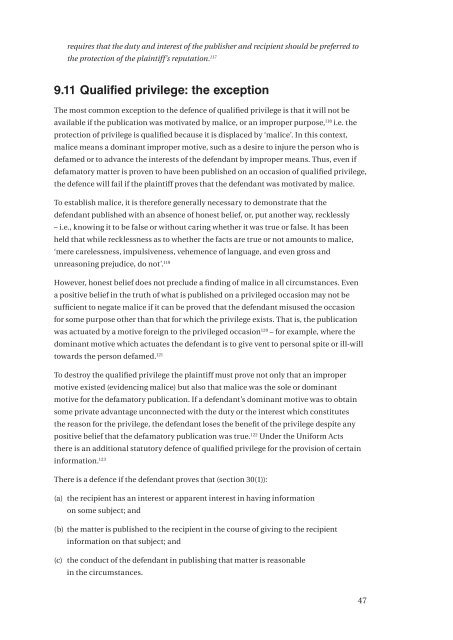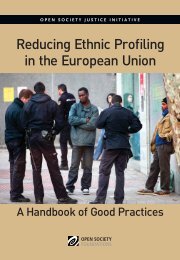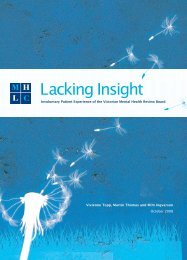Responding to the financial abuse of older people - Loddon ...
Responding to the financial abuse of older people - Loddon ...
Responding to the financial abuse of older people - Loddon ...
- No tags were found...
Create successful ePaper yourself
Turn your PDF publications into a flip-book with our unique Google optimized e-Paper software.
equires that <strong>the</strong> duty and interest <strong>of</strong> <strong>the</strong> publisher and recipient should be preferred <strong>to</strong><br />
<strong>the</strong> protection <strong>of</strong> <strong>the</strong> plaintiff’s reputation. 117<br />
9.11 Qualified privilege: <strong>the</strong> exception<br />
The most common exception <strong>to</strong> <strong>the</strong> defence <strong>of</strong> qualified privilege is that it will not be<br />
available if <strong>the</strong> publication was motivated by malice, or an improper purpose, 118 i.e. <strong>the</strong><br />
protection <strong>of</strong> privilege is qualified because it is displaced by ‘malice’. In this context,<br />
malice means a dominant improper motive, such as a desire <strong>to</strong> injure <strong>the</strong> person who is<br />
defamed or <strong>to</strong> advance <strong>the</strong> interests <strong>of</strong> <strong>the</strong> defendant by improper means. Thus, even if<br />
defama<strong>to</strong>ry matter is proven <strong>to</strong> have been published on an occasion <strong>of</strong> qualified privilege,<br />
<strong>the</strong> defence will fail if <strong>the</strong> plaintiff proves that <strong>the</strong> defendant was motivated by malice.<br />
To establish malice, it is <strong>the</strong>refore generally necessary <strong>to</strong> demonstrate that <strong>the</strong><br />
defendant published with an absence <strong>of</strong> honest belief, or, put ano<strong>the</strong>r way, recklessly<br />
– i.e., knowing it <strong>to</strong> be false or without caring whe<strong>the</strong>r it was true or false. It has been<br />
held that while recklessness as <strong>to</strong> whe<strong>the</strong>r <strong>the</strong> facts are true or not amounts <strong>to</strong> malice,<br />
‘mere carelessness, impulsiveness, vehemence <strong>of</strong> language, and even gross and<br />
unreasoning prejudice, do not’. 119<br />
However, honest belief does not preclude a finding <strong>of</strong> malice in all circumstances. Even<br />
a positive belief in <strong>the</strong> truth <strong>of</strong> what is published on a privileged occasion may not be<br />
sufficient <strong>to</strong> negate malice if it can be proved that <strong>the</strong> defendant misused <strong>the</strong> occasion<br />
for some purpose o<strong>the</strong>r than that for which <strong>the</strong> privilege exists. That is, <strong>the</strong> publication<br />
was actuated by a motive foreign <strong>to</strong> <strong>the</strong> privileged occasion 120 – for example, where <strong>the</strong><br />
dominant motive which actuates <strong>the</strong> defendant is <strong>to</strong> give vent <strong>to</strong> personal spite or ill-will<br />
<strong>to</strong>wards <strong>the</strong> person defamed. 121<br />
To destroy <strong>the</strong> qualified privilege <strong>the</strong> plaintiff must prove not only that an improper<br />
motive existed (evidencing malice) but also that malice was <strong>the</strong> sole or dominant<br />
motive for <strong>the</strong> defama<strong>to</strong>ry publication. If a defendant’s dominant motive was <strong>to</strong> obtain<br />
some private advantage unconnected with <strong>the</strong> duty or <strong>the</strong> interest which constitutes<br />
<strong>the</strong> reason for <strong>the</strong> privilege, <strong>the</strong> defendant loses <strong>the</strong> benefit <strong>of</strong> <strong>the</strong> privilege despite any<br />
positive belief that <strong>the</strong> defama<strong>to</strong>ry publication was true. 122 Under <strong>the</strong> Uniform Acts<br />
<strong>the</strong>re is an additional statu<strong>to</strong>ry defence <strong>of</strong> qualified privilege for <strong>the</strong> provision <strong>of</strong> certain<br />
information. 123<br />
There is a defence if <strong>the</strong> defendant proves that (section 30(1)):<br />
(a) <strong>the</strong> recipient has an interest or apparent interest in having information<br />
on some subject; and<br />
(b) <strong>the</strong> matter is published <strong>to</strong> <strong>the</strong> recipient in <strong>the</strong> course <strong>of</strong> giving <strong>to</strong> <strong>the</strong> recipient<br />
information on that subject; and<br />
(c) <strong>the</strong> conduct <strong>of</strong> <strong>the</strong> defendant in publishing that matter is reasonable<br />
in <strong>the</strong> circumstances.<br />
47
















